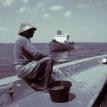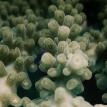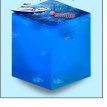Shark Research Programme
12 May 2014
Prior to the expansion of the shark fishery, in earlier times the shark fishery was a small-scale traditional one. Sharks were solely targeted to make crude shark liver oil needed for the maintenance of the wooden boats. In the 1970s, with developments in trade, introduction of new fishing techniques and widespread motorization of boats, the traditional shark fishery evolved to completely export oriented fisheries. Exploitation of both reef-associated and oceanic sharks started. In the Maldivian shark fisheries, the whole shark was utilized. Shark fins and shark meat were dried and exported to South-East Asian and South Asian markets, whereas shark jaws were sold as souvenirs to tourists. By early 1980s, there were three types of shark fisheries; the deep water gulper shark fishery, the reef shark fishery and the oceanic shark fishery. Both the reef shark fishery and oceanic shark fishery were always in conflict with the two main industries; the tourism and pole and line tuna industry respectively. As a result, many management decisions taken on shark fisheries were to minimize these conflicts. One such measure was the ten-year moratorium on shark fishing imposed in 7 atolls in 1998.
Shark Fishing Ban
By the end of the moratorium in 2008, with lowered number of reef-associated shark sightings, coupled with declining status of shark fisheries, on 1st of March 2009, the government declared a ban on reef shark fishing within 12 nautical miles from outer rims of all atolls of Maldives. As it was seen that shark fishing could have adverse effects on the two main industries; the tourism and tuna fisheries, a year later, on 15th of March 2010, a total ban on shark fishing was imposed in entire Maldivian waters.
National Plan of Action on the Conservation and Management of Sharks
In collaboration from the Bay of Bengal Large Marine Ecosystem (BoBLME) Project, the Maldives has developed its 1st National Plan of Action on Conservation and Management of Sharks (NPoA-Sharks). Under further collaboration with BoBLME, an assessment has been undertaken to determine teh socio-economic impact of the fishing ban on former shark fishermen.
Maldives Sharkwatch Programme
Commenced in 2009, as part of the Darwin Reef Fish Project (2009-2013), in partnership with Marine Conservation Society, Maldives Sharkwatch Programme aims to collect baseline data on the abundance and distribution of reef associated sharks in the Maldives. Sharkwatch is a citizen-science programme where data collection is done through dive tourism community.
The objective of the programme:
- To estimate the baseline abundance of the reef-associated sharks at the time of the shark fishing ban
- Evaluate the effectiveness of the fishing ban on rehabilitating shark stocks
- Identify hot spots for reef-associated sharks
- Engage civil society in monitoring of endangered species
MRC intends to disseminate the findings of the Sharkwatch programme to the participating tourist resorts every year. In addition to this, MRC also intends to provide trainings on Sharkwatch programme to new resorts as well.
Maldives Sharkwatch reports for the years 2009-2013 have been prepared. The programme is ongoing and is in its 6th year now.





